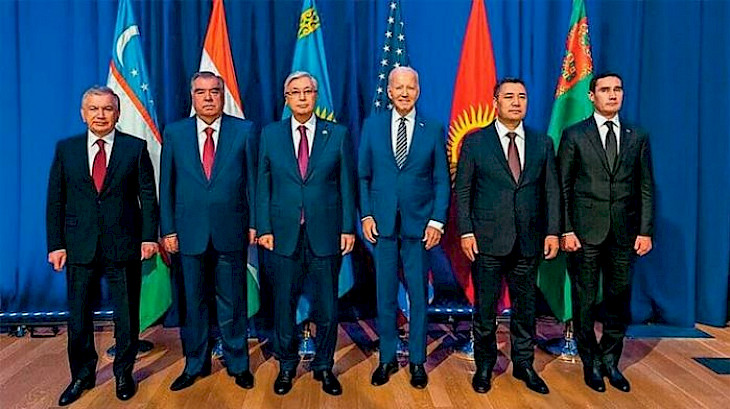The American establishment is trying to buy itself a place in the Central Asian sun
During the United Nations General Assembly in New York in late September 2023, President Joe Biden held discussions with the leaders of Central Asian countries, paying particular attention to the post-Soviet republics: Turkmenistan, Kazakhstan, Uzbekistan, Tajikistan, and Kyrgyzstan, collectively known as the "C5" in the USA.
The White House stated that "President of the United States discussed with the interlocutors the importance of creating a more favorable business environment for trade with American companies and private sector investments through the establishment of a private sector business platform, complementing the 'C5+1' diplomatic platform,... The United States proposed initiating the 'C5+1' Dialogue on the critical mineral resources for the development of Central Asia's vast mineral wealth and enhancing the security of vital mineral resources. These efforts are part of the ongoing U.S. work to support investment in the Trans-Caspian Transport Route (the so-called 'Middle Corridor') and its development through partnerships for global infrastructure and investments."
This commentary is quite straightforward – the United States seeks to gain access to natural resources and establish control over communication routes in the region.
The meeting of the leaders of Central Asian countries was expected and appeared to be programmed in the agenda of the US State Department. Earlier this year, prominent American scholar Frederick Starr, specializing in Central Asian countries and having ties to the US establishment, published a report based on field research in the region regarding perceptions of US actions. Based on the released report, it can be inferred that Central Asian countries have been critical of the United States recently, although there is a certain network of pro-Western individuals expecting grant assistance from Washington and, therefore, talking about the increasing influence of Russia and China. The recommendations pointed to the need for a meeting between the US President and the heads of these republics. It also emphasized the importance of various economic instruments that strengthen US influence in the region. The idea of involving Azerbaijan in the common regional agenda was mentioned, which would transform the concept of 'C5+1' into 'C6+1.'
Gradual economic engagement of the West in the affairs of Central Asian countries may eventually change the political atmosphere. Various pretexts could be used for this purpose. For example, Uzbekistan could become an energy hub, not only in terms of gas transit but also for alternative energy sources.
The New York Times reports that "the Emirates want to be seen as a climate-friendly superpower in renewable energy, investing billions in wind and solar power in places like Uzbekistan, even as they help developing countries produce fossil fuels for decades with other investments." It is likely that the EU and the US will also take advantage of Uzbekistan's current economic openness.
Media reports suggest that Beijing might abandon Russian transit routes to avoid Western sanctions and use a new route through Kyrgyzstan instead.
The establishment of such a railway branch will significantly reduce travel time and provide an alternative to the current Kazakhstan-Russia route. From Uzbekistan, the railway can connect with the Uzbekistan-Turkmenistan railway to the port of Turkmenbashi on the Caspian Sea or to the port of Baku in Azerbaijan, as well as gain access to the markets of Georgia, Turkey, and even countries in the Black Sea region, such as Bulgaria.
For Kyrgyzstan, there is an interest in this as well since, like Uzbekistan, the country has no access to the sea.
From a geopolitical perspective, the railway aligns with China's broader foreign policy goals under the Belt and Road Initiative, aimed at strengthening transport connectivity and economic cooperation across Eurasia.
RAND Corporation is also concerned about US interests in Central Asia. Analyst Hunter Stoll suggests resuming economic investments in the region. This year, US Secretary of State Antony Blinken visited Kazakhstan and Uzbekistan, marking the first personal visit by a sitting US Secretary of State in over three years. During his visit, he met with representatives from the five Central Asian countries. Blinken announced that the Biden administration would provide $20 million in funding for the Economic Resilience Initiative for Central Asia (ERICEN), bringing the total funding to $50 million. ERICEN has three main directions: expanding trade routes, strengthening the private sector, and investing in people through professional training and education.
This can be seen as a form of soft power. Stoll suggests using hard power instruments as well, such as US military presence in Central Asia. To achieve this, a suitable cover is needed - counterterrorism efforts.
To avoid provoking Russia or China, the US presence should be minimal, while the benefits should be maximal.
The State Partnership Program encourages relations between units of the US National Guard and the countries of Central Asia. Since 2002, the Virginia National Guard has been cooperating with Tajikistan; since the 1990s, the National Guards of Arizona and Montana have been cooperating with Kazakhstan and Kyrgyzstan, respectively; the Mississippi National Guard and Uzbekistan have cooperated since 2012, and until 2011, the Nevada National Guard cooperated with Turkmenistan.
Additionally, since 2002, US forces have conducted several "Steppe Eagle" exercises - multinational training events involving American, British, Kazakh, Kyrgyz, Uzbek, and Tajik troops.
Stoll emphasizes the importance of the real functions of the US Central Command's special units in the region's areas of responsibility.
Undoubtedly, given Russia's involvement in Ukraine, the US and the EU will seek to take advantage of this situation. Against the backdrop of regular reports of Russophobia in Kazakhstan or attempts to escalate relations between Kyrgyzstan and Tajikistan, any signals of increased Western presence in Central Asia should raise concerns.
Source: Fondsk.ru
CentralasianLIGHT.org
October 2, 2023

